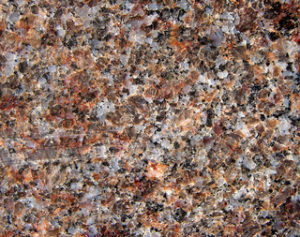I edit scientific papers; although my background is in astronomy, geology papers may be my favorite. I love the lingo of geology—greywacke, gneiss, drumlin, plagioclase feldspar, obsidian, alluvial fan—and I’ve always been curious about the origins of some of the more exotic terms. When I started to investigate them, I found that even common terms often have an interesting etymology.

Granite, for example, springs from the same root (so to speak) as corn—not necessarily the corn that we call corn today, but in the older sense, in which the word refers to the local grain crop. Granite has a granular texture, and the Latin word granum is the ultimate source of the words granite (from the past tense of the verb grano, “to make grainy”) and corn. All right, I thought, these geology words are well worth pursuing.
Then I was having lunch with my son a few days later and he told me that his then six-month-old son, a born kicker, had recently kicked him in the xiphoid process (a small bone spur in the chest). I sympathized, but at the same time, the phrase “kicked in the xiphoid process” made me giggle. (It could be hazardous if an adult were to kick you there; however, a xiphoid kick from a baby is an uncomfortable indignity but is not likely to be lethal.) And again I wondered, why do they call it the xiphoid process? How about the sigmoid process? What is a process, anyway?
One last story: I was sitting near some people at a coffeehouse and inadvertently overhearing their discussion; for some reason they needed to know whether a centrifugal force pulled inward or outward. One of them reasoned that because of the way a centrifuge works, it must go outward, which was an excellent way to approach the question. Another nice approach is to remember that the Latin root fugere means “to flee” (a mnemonic is the phrase “Tempus fugit,” which translates literally as “Time flees”), so under a centrifugal force, objects flee the center of a circle. We can also trace fugitive and refugee back to fugere.
Put all this together, and it occurred to me that learning more about the Latin, Greek, or other roots of scientific words and/or the stories of their origins is a great way to understand more about science and its history. Hence, this blog. I’m going to explore the answers to my questions about rocks, minerals, and processes, along with many other things, and share what I learn here. I hope this will be a helpful and entertaining site to anyone who is curious about science and wants to learn the stories behind the curious and often beautiful words it uses, as well as the history hidden behind very familiar words.